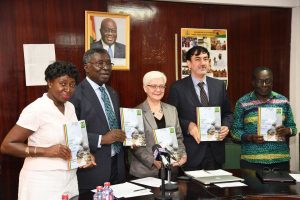News
Environment Ministry launches road map to address pollution

The Ministry of Environment, Science, Technology and Innovation (MESTI) has developed a road map to address pollution in the country.
Dubbed the “Health and Pollution Action Plan (HPAP)”, the road map was facilitated by the United Nations Industrial Development Organisation (UNIDO), in collaboration with the World Health Organisation (WHO-Ghana), with funding from the European Union (EU) and the United States Agency for International Development (USAID).
Included in the road map is a proposal for three projects focusing on municipal solid waste management, resource efficiency and cleaner production and mapping of contaminated sites.

Pollution
Launching the report at a ceremony in Accra yesterday, the sector Minister, Professor Kwabena Frimpong-Boateng, said there was increased pollution in the country.
That, he said, included water bodies, air and plastic pollution, all very harmful to humans and animals.
He disclosed that mosquito coils, which were intended to kill and drive mosquitoes away to prevent malaria, could cause harm to the lungs.
Additionally, he said, the country’s water bodies were heavily polluted by the activities of illegal miners (galamseyers), which in turn caused a lot of harm to the human body and animals who drank the water or ate the vegetation around those sites.
He noted, however, that there had been some level of awareness of the importance to sustain the environment and keep it safe.
Health and Pollution Action Plan
Prof. Frimpong-Boateng said the HPAP, if well implemented, would help mitigate the levels of pollution in the environment.
“The government has taken a number of steps towards addressing the impact of pollution on human health. The HPAP will give impetus to our commitment and provide a sense of direction,” he stated.Global project
The UNIDO Representative in Ghana and Liberia, Mr Fakhruddin Azizi, explained that the support to Ghana formed part of a global project by the organisation to assist governments of low and middle-income countries in the development of national pollution strategies aimed at reducing health risks.
He said the need to embark on such a project was inspired by a number of targets in the Sustainable Development Goals (SDGs), including Target 9 of Goal 3, which seeks to work towards substantially reducing the number of deaths and illnesses from hazardous chemicals, as well as air, water and soil pollution and contamination, by 2030.
Mr Azizi further explained that the focus of the project was on air pollution, indoor air pollution, water pollution, soil contamination and exposure to chemicals at the workplace.
He expressed the hope that the plan would give a sense of direction and the needed impetus to Ghana’s drive towards addressing environmental pollution.
Air pollution
The National Programme Officer of WHO, Mr Gordon Dakuu, in his remarks, said air pollution was linked to more than 28,000 premature deaths in Ghana every year, with people living in Accra and other urban areas being the worst impacted.
Making reference to WHO figures, he said about 203 out of every 100,000 deaths in Ghana were air pollution-related.
He also said that Ghana had higher levels of dust, above the limits set by WHO, noting that that development was associated with heart diseases, asthma, stroke and lung cancer.
He expressed concern about the inability of the Environmental Protection Agency (EPA) to issue air quality alerts to the public on a regular basis.
“Ghana does some air quality monitoring alright but it is limited to only 15 locations, all in the Greater Accra Region and none for the other regions,” Mr Dakuu said.
Source: graphic.com



